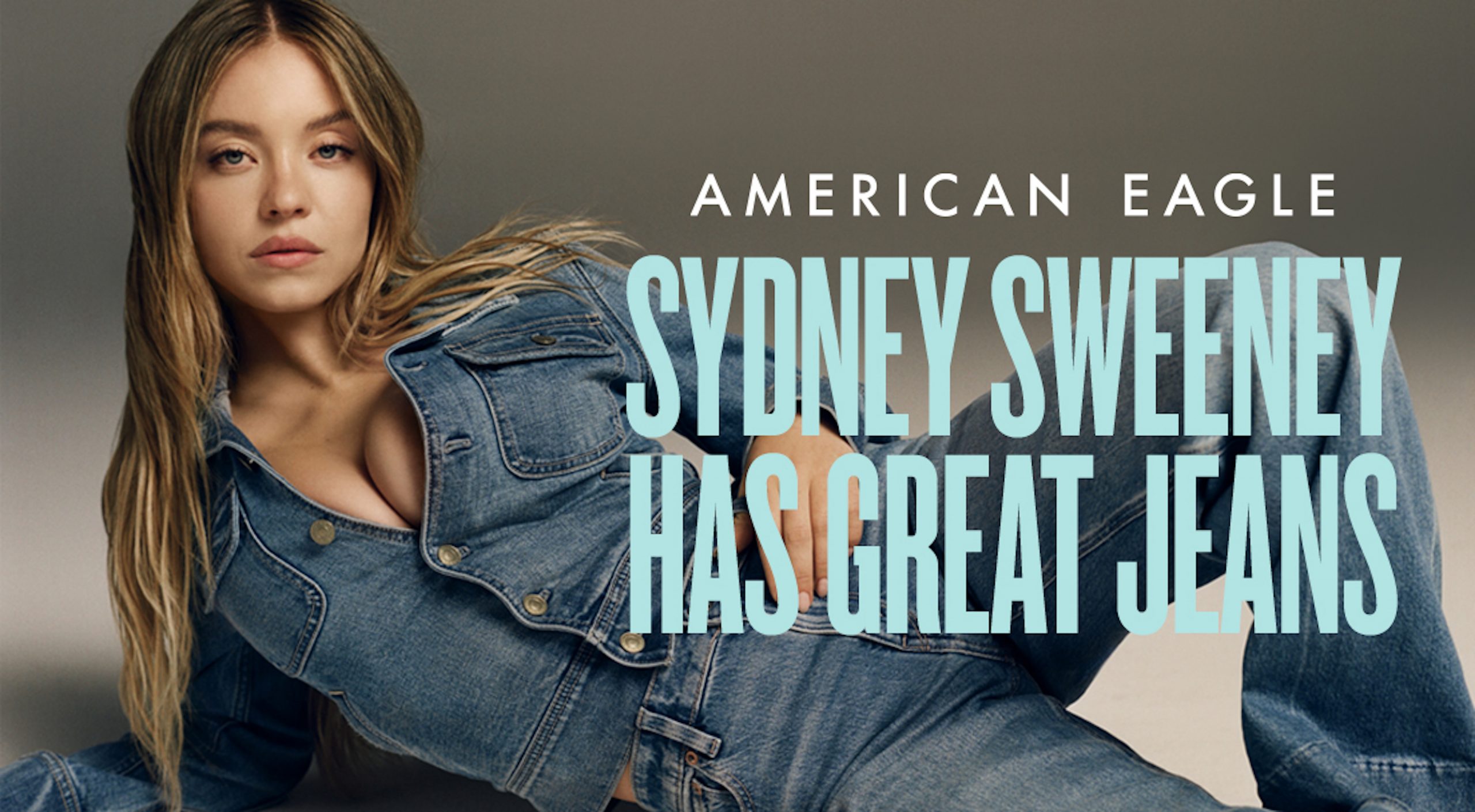
Actress Sydney Sweeney is caught in a media firestorm over her jeans ad for American Outfitters. (Photo: AE)
Sydney Sweeney, the voluptuous, blonde hair, blue eyed Gen-Z actress, knows how to fill out a pair of jeans.
So it’s no surprise American Eagle Outfitters saw her as a natural choice for a fall ad campaign.
“She brings the allure, and we add the flawless wardrobe for the winning combo of ease, attitude and a little mischief,” the company touted in a press release.
But the creative department failed to notice the implications. The ad conflated its “jeans” with Sweeny’s “genes,” suggesting her blonde, blue-eye features represented superior beauty, and by association, the superiority of its clothing.
During the two-minute spot, Sweeney, 27, discusses how “genes are passed down from parents to offspring, often determining traits like hair color, personality, and even eye color,” before stating, “My jeans are blue,” as the camera shifts to her blue eyes.
The ad clearly stumbled over “playful wordplay and outdated messaging around beauty standards and genetic traits,” according to one report.
But critics also quickly jumped on it as a dog whistle for the Nazi glorification of the Aryan race.
Hitler believed that fair-skinned, blonde, blue-eyed people of Nordic descent were genetically superior to other races. The idea provided the justification for Germany’s extermination of Jews, Gypsies, the crippled, mentally ill and others during World War II.
“I’m black so personally I found it to be triggering. It was obviously a thinly veiled promotion of eugenics [the underlying philosophy of Nazi racism],” wrote one Reddit poster.
“It seemed like the subtext was that she was offering herself to be bred with the goal of passing on her ‘pure white genes’ to future offspring.”
From there, it didn’t take long to make the leap into the MAGA cultural wars.
“This is reflective of the part of the conservative movement in the U.S. that resulted in the rollback of Roe v. Wade (the abortion rights Supreme Court ruling].
“White men want to force white women to be nothing more than breeders to increase the white population of the country in order to combat the changing ethnic demographics. It is just as damaging to white women and shows that she is even willing to hurt her own just for a buck.”
Check out the ad:
American Eagle apparently knew the ad would be controversial and even provocative, given Sweeney’s sexuality and hints of nudity (no bra, no underwear). The ad was “definitely going to push buttons,” the company’s chief marketing officer told trade media outlets.
Some compared it to the Brooke Shields ads for Calvin Klein jeans in 1980, when she was just 15. Shields did a whole riff on genes as a play on words with jeans, but not with the same suggestion of racial superiority.
Ironically, blonde hair and blue eyes are generally considered recessive traits in human genetics. Brown hair and brown eyes are the dominant traits. But enough about science.
The ads quickly became fodder for influencers on social media, with the actress caught in the crossfire.
“Anyone saying the Sydney Sweeney jeans /genes ad isn’t disturbing is just outing themselves. American Eagle Outfitters is out here pushing Nazi propaganda for the “superior” Aryan race. Did y’all forget history class or something?” wrote one poster on the social media site “X.”
Another post countered: “Nothing about the Sydney Sweeney ad is offensive. Beautiful women were used to market products during America’s best days. Overt heterosexuality is not shameful.”
“Woke is dead!” declared yet another.
“So happy the WOKE crap is rapidly disappearing- Kudos to American Eagle and their Jean ad with Sydney Sweeney standing up to WOKE.”
“Ugly liberal women are losing their minds over this. They thought they’d outlawed this kind of thing.”
Even Steven Cheung, a longtime adviser for President Donald Trump and frequent author of his social media posts weighed in, calling it “cancel culture run amok.”
“This warped, moronic and dense liberal thinking is a big reason why Americans voted the way they did in 2024,” he wrote on X, July 29,
In contrast, MSNBC producer Hannah Holland wrote in an op-ed, arguing that it has been fair “to condemn the advertisement as noninclusive at best and as overtly promoting “white supremacy” and “Nazi propaganda” at worst.”
“The advertisement, the choice of Sweeney as the sole face in it and the internet’s reaction reflect an unbridled cultural shift toward whiteness, conservatism and capitalist exploitation. Sweeney is both a symptom and a participant,” she asserted.
Still others tried to see through the media storm.
“OMG you guys are trying so hard to make this into a new culture war,” wrote one poster on “X.”
“It’s pretty lame. No one on the left is mad about Sydney Sweeney She’s not MAGA and can’t stand you incels. Find something else to generate fake outrage about; this is just pathetic.”
In a further irony, Sweeney is not a natural blonde; she’s a brunette.
The MAGA right has been quick to adopt her as an idealized symbol of an American woman, but Sweeney has been very low key about her politics.
Her only political pronouncements have been in favor of abortion and women’s rights and opposed to domestic violence, which hardly puts her in the MAGA column.
Of course, none of the resulting attention focused on the ad’s subject — American Eagle jeans.
American Eagle stock got a one-day, 10% bump in price before it fell back to its usual trading range. and the publicity is unlikely to erase a reported loss of $85 million and 3% decline in comparable sales in its fiscal first quarter ending May 3.
Still, in advertising circles, such indirect publicity is known for having a “halo effect.” The product benefits from a spillover of attention without being the immediate subject of all the interest.
Or as showman P.T.Barnum once reportedly said: “There is no such thing as bad publicity.”



